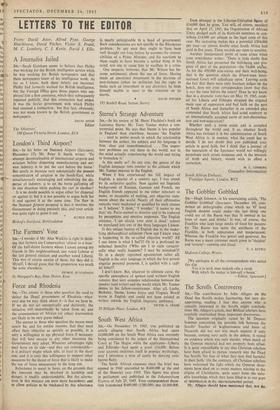Force and Rhodesia
SIR,—The answer to those who question the need to
a defeat the illegal government of Rhodesia—what-
ever else we may think about it—is that we have to.
If we do not act energetically and decisively, the p initiative will undoubtedly be taken from us; and F, the consequences of African (or other) intervention r are likely to be very grave indeed. it The answer to those who question the means must surely be, and for similar reasons, that they must effect their objective as quickly as possible. It is only a willingness to use physical force if necessary that will lend success to any other measures the Government may adopt. Whatever advantages right may have on its side—and they are considerable— it is _military might which tells, at least in the short run; and it is only this willingness to support other measures by the threat of force that is likely to make the use of force unnecessary in the long run.
Reluctance to resort to force, on the grounds that the innocent may be involved in hardship and danger, is readily understandable. But the alterna- tives in this instance are even more hazardous; and to allow policies to be weakened .by this reluctance is nearly unforgivable in a head of government. Such considerations are not specific to the Rhodesian problem: by any man they ought to have been well thought out long before he assumes the respon- sibilities of a Prime Minister, and his reactions to them ought to have become a settled thing in his mind, not one to cause him to vacillate in a crisis.
One suspects, however, that Mr. Wilson has be- come sentimental about the use of force. Having made an emotional investment in the doctrine of non-violence (when no politician has the right to make such an investment in any doctrine), he finds himself unable to react to the situation on its merits.
195 Betthill Road, Sutton, Surrey






























 Previous page
Previous page